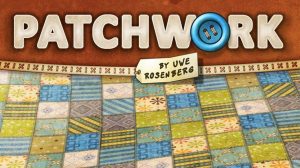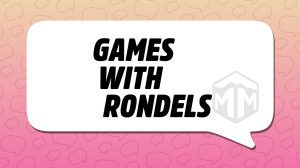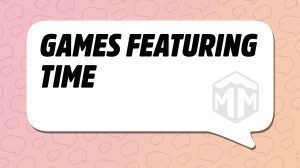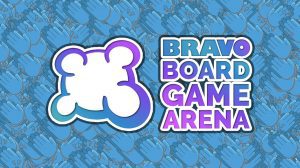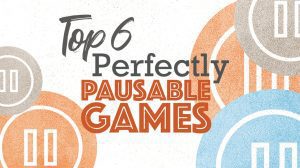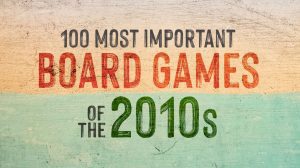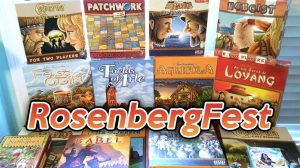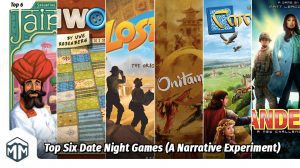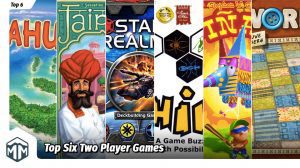In Patchwork, two players compete to build the most aesthetic (and high-scoring) patchwork quilt on a personal 9x9 game board. To start play, lay out all of the patches at random in a circle and place a marker directly clockwise of the 2-1 patch. Each player takes five buttons — the currency/points in the game — and someone is chosen as the start player.
On a turn, a player either purchases one of the three patches standing clockwise of the spool or passes. To purchase a patch, you pay the cost in buttons shown on the patch, move the spool to that patch's location in the circle, add the patch to your game board, then advance your time token on the time track a number of spaces equal to the time shown on the patch. You're free to place the patch anywhere on your board that doesn't overlap other patches, but you probably want to fit things together as tightly as possible. If your time token is behind or on top of the other player's time token, then you take another turn; otherwise the opponent now goes. Instead of purchasing a patch, you can choose to pass; to do this, you move your time token to the space immediately in front of the opponent's time token, then take one button from the bank for each space you moved.
In addition to a button cost and time cost, each patch also features 0-3 buttons, and when you move your time token past a button on the time track, you earn "button income": sum the number of buttons depicted on your personal game board, then take this many buttons from the bank.
What's more, the time track depicts five 1x1 patches on it, and during set-up you place five actual 1x1 patches on these spaces. Whoever first passes a patch on the time track claims this patch and immediately places it on his game board.
Additionally, the first player to completely fill in a 7x7 square on his game board earns a bonus tile worth 7 extra points at the end of the game. (Of course, this doesn't happen in every game.)
When a player takes an action that moves his time token to the central square of the time track, he takes one final button income from the bank. Once both players are in the center, the game ends and scoring takes place. Each player scores one point per button in his possession, then loses two points for each empty square on his game board. Scores can be negative. The player with the most points wins.
Gather your fabric, grab your needle, and hold onto your batting because we’re about to talk about Patchwork! Read our review now.
Join Meeple Mountain to celebrate Dr Reiner Knizia’s 40 year board game career by journeying through his game portfolio, from A to Z. This time features ‘F’!
Join Meeple Mountain as we sound off on the language the hobby uses to discuss complexity in games. We’re going deep to discuss this weighty matter!
Rondels are a popular board game mechanic. Here are some games that use rondels well.
Polyominoes, those shapes made from adjoining squares, have become a part of many games in recent years. Here's a list of some that have caught the attention...
Some people might think that board games are a waste of time, but we know differently – board games are an incredible way to spend time! The passing of...
The last 18 months have been tough for all of us who love the board gaming. Justin discusses how the website Board Game Arena keeps him afloat during a...
Our third collection of board game haiku explores some stone cold classics as well as some recent smash hits, all in seventeen syllables!
Ever walked away from a board game and forgotten whose turn it is when you got back? Well, not anymore. Check out our list of the Top 6 Perfectly Pausable...
Today we review Thebes, a Spiel des Jahres nominated game with an innovation that influenced modern game design — and you probably didn’t even know it...
This is everything you ever wanted to know about the Spiel des Jahres board game awards, including a complete list of every winner, nominee, and recommendee...
Ten years is a long time in board gaming! Join us as we look back on the smart, influential, weird and crazy things that emerged from the last decade of games.
The golden age of tabletop gaming has consequently led to a similar surge in mobile applications that can easily adapt board games to phones and tablets. New...
The idea: try to plow through 17 Uwe Rosenberg games in a single 3-day weekend. Was I successful or was I too ambitious? Read on to find out!
Every game is an “Abstract” game. Let’s get that out of the way early. Every game you will ever find is, to varying degrees, an abstraction of whatever concept...
I’m trying something new and experimental this week. Come check out my Top Six date night games with a twist! This Top Six list comes in story form! Read on to...
Gaming with a large group is fun, but nothing beats the head to head action of a good two player game. Let's take a look at our top 6 two player games to see...



